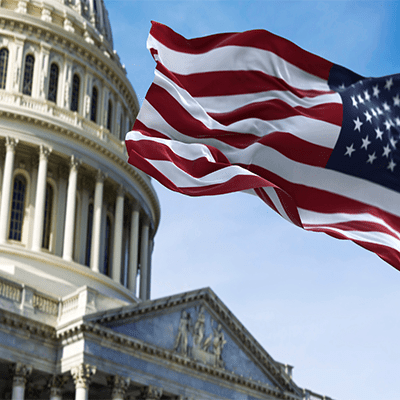Knowledge and Insights
One Big Beautiful Bill: What It Means for Your Taxes in 2025 & Beyond
July 2025

Signed into law on July 4, 2025, the One Big Beautiful Bill Act (OBBBA) brings sweeping changes to the U.S. tax code that could significantly impact your financial strategies and tax planning. The OBBBA extends key provisions of the Tax Cuts and Jobs Act (TCJA) set to expire at the end of 2025 and also introduces new tax law.
Whether you’re leading a business or managing household finances, these changes call for a comprehensive review of your current tax planning and strategy. In this article, we summarize the key provisions from the OBBBA and how they may impact you. You can also download a copy of our One Big Beautiful Bill Act Reference Guide for Businesses and Individuals.
KEY BUSINESS TAX CHANGES
QBI DEDUCTION MADE PERMANENT
Previously set to expire, the 20% deduction for qualified business income (QBI) under Section 199A is now permanent, with increased phase-out thresholds for tax years after December 31, 2025, as well as a new $400 minimum deduction for QBI above $1,000.
R&E EXPENSING – RETROACTIVE & IMMEDIATE
Under the TCJA, domestic research expenses were amortized over five years. That’s now reversed. Starting in 2025, domestic research and experimentation (R&E) expenses can be fully expensed. Even better, the law allows for retroactive application to 2022, opening the door for amending previous returns to unlock potential refunds.
This is a strategic opportunity for small and midsize businesses engaged in product development or process improvements.
CAPITAL INVESTMENT JUST GOT EASIER
With 100% bonus depreciation permanently extended for qualifying property placed in service after January 19, 2025, businesses can immediately deduct the full cost of assets like machinery, equipment, and even certain vehicles.
Additionally, Section 179 expensing limits increased to $2.5 million (up from $1.16M), with phase-outs starting at $4 million.
These changes simplify capital budgeting decisions and can lower taxable income significantly in the year of purchase.
ADDITIONAL BUSINESS HIGHLIGHTS
- Qualified Small Business Stock (QSBS) under Section 1202: Now allows tiered exclusions based on holding period, with the corporate asset limit increased to $75M.
- Pass-Through Entity Tax: The OBBBA does not limit or address the pass-through entity tax workarounds used by taxpayers to avoid the SALT cap. If you operate as a partnership, S Corporation, or LLC, this could translate into meaningful tax savings—especially in high-tax states like New Jersey, New York, Connecticut or California.
- Interest expense limitations under Section 163(j): Returns to EBITDA basis with no expiration.
- FDII and GILTI deductions are renamed (FDDEI and NCTI) and slightly reduced.
- Charitable deductions by corporations: Now subject to a 1% floor and capped at 10% of taxable income.
- Form 1099 thresholds: The threshold increases to $2,000 (from $600), reducing unnecessary filings for small, infrequent payments.
For guidance tailored to your company, contact Mercadien’s team of business tax experts.
WHAT’S CHANGING FOR INDIVIDUAL TAXPAYERS
STANDARD DEDUCTION INCREASED
The standard deduction is now permanently higher and indexed for inflation.
PERSONAL EXEMPTIONS & SENIOR DEDUCTION
Permanently eliminates the deduction for personal exemptions and creates a temporary senior deduction, subject to phase-out, for years 2025 through 2028.
SALT CAP MORE FLEXIBLE
Individual SALT itemized deductions are now capped at $40,000, subject to income phaseouts—but never dropping below the original $10,000. This flexibility will help many homeowners, particularly in states with high property taxes.
A SLIGHTLY STRONGER CHILD TAX CREDIT
The Child Tax Credit increases to $2,200 per qualifying child and remains partially refundable up to $1,700. This amount is indexed for inflation and subject to phase-outs.
CHARITABLE DEDUCTIONS
Beginning in 2026, non-itemizers can deduct up to $1,000 ($2,000 for joint returns). For taxpayers who itemize, the deduction is allowed only for contributions that exceed 0.5% of the taxpayer’s contribution base. The 60% of AGI limit for cash contributions to public charities is made permanent.
ESTATE, GIFT & GENERATION SKIPPING TRANSFER TAX EXEMPTION INCREASED & PERMANENT
Estate & Gift tax exemption is increased to $15 million per taxpayer in 2026 and indexed for inflation thereafter. Increased exemptions facilitate additional opportunities to reassess estate and gifting plans to optimize tax benefits.
OTHER PERSONAL TAX UPDATES
- Auto Loan Interest: For the first time, you can deduct up to $10,000 in interest on auto loans, subject to phaseouts and other restrictions (temporary provision).
- Tips and Overtime Deduction: Deduction for years 2025 through 2028 per taxpayer (for tips $25,000 and for overtime pay $12,500) is subject to phaseout.
- Alternative Minimum Tax (AMT): The higher TCJA exemptions are now permanent, but the phase-out rate doubles from 25% to 50%, clawing back the benefit more quickly for upper-income filers.
- 529 Plans: Now allows expenses related to homeschool, private K-12, and even postsecondary certifications—such as CPA exam costs.
- “Trump Accounts”: A new pilot program offers a one-time $1,000 federal contribution to each child born between 2025 and 2029—details and income limits TBD.
OUR TEAM OF TAX EXPERTS ARE HERE TO HELP
The OBBBA will impact each taxpayer differently depending on your specific circumstances. Understanding any new tax law changes and their potential impact on business and personal finances can be a difficult task, but it doesn’t have to be.
Mercadien’s team of tax and financial planning experts are here to help you cut through the complexity and identify the strategies that work best for your specific situation.
Contact us today to schedule a consultation.
DISCLAIMER: This advisory resource is for general information purposes only. It does not constitute business or tax advice and may not be used and relied upon as a substitute for business or tax advice regarding a specific issue or problem. Advice should be obtained from a qualified accountant, tax practitioner or attorney licensed to practice in the jurisdiction where that advice is sought.
